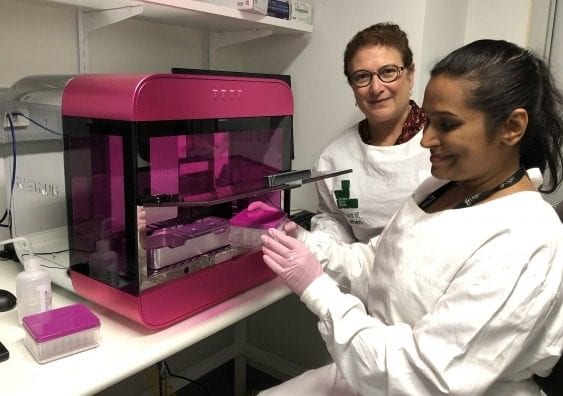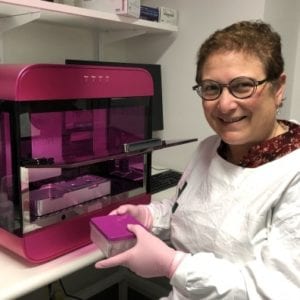Rastrum 3D bioprinter was a result of a strong collaboration between UNSW Sydney, Children’s Cancer Institute and Inventia Life Science. These groups included the expertise of two female researchers in cancer biology and therapy.
Professor Maria Kavallaris is the Head of Tumour Biology and Targeting Program at Children’s Cancer Institute and Dr Lakmali Atapattu is a postdoctoral research scientist in Professor Kavallaris’ group at the Institute. Professor Kavallaris and Dr Atapattu analysed cells to develop the cell biology behind the printer as well as replicate tumour-like environments. Professors Justin Gooding and Maria Kavallaris lead the project at UNSW and the Children’s Cancer Institute providing their expertise in Chemistry, Cancer Biology and devices and played a key role in the development of the 3D bioprinter.
The Award is the oldest international award for design and innovation in Australia and celebrates the best products and services across the nation’s market. It rewards emerging areas of design including business model innovation, social impact and sustainability.
“The printer is revolutionary in its ability to control and replicate the volatile cancer environment that we are working with and reproduce different types of cancers,” said Professor Kavallaris.
The development of the bioinks and bioprinter was funded by Australian Research Council’s Linkage Project Grants and the first fully engineered model was sold late 2018.
Professor Kavallaris said, “For the first time we have a machine that can model cancer disease, therapeutic responses and test new drugs. We can analyse the ways drugs are impacting the survival of the tumour and potentially feed that back to clinicians – even test drugs they may not have thought about giving and reduce exposing patients to undue toxicity.”
Both researchers have had distinguished careers in the sciences so far.
Dr Atapattu completed her Bachelor of Biomedical Science Degree and her PhD in the Biomedicine Discovery Institute at Monash University. She undertook her first postdoctoral appointment at the Hudson Institute of Medical Research in 2015 and is a conjoint lecturer at the University of NSW.
Professor Kavallaris’ research focuses on the action and resistance of anticancer drugs and aims to develop less toxic cancer therapies using nanotechnology. In 2015, she was named an Australian Financial Review/Westpac 100 Woman of Influence and won the NSW Premier’s Science and Engineering Prize of Leadership in Innovation in 2017. This year, she was awarded an Order of Australia for her scientific service to childhood and adult cancers.
“This is an amazing starting point for researchers to use our imaginations and develop cell models to study disease,” she said.
Born in Australia to Greek Cypriot parents, Kavallaris and her family emigrated to Cyprus when she was young, only to return to Australia in the 70s when the Turkish invaded Cyprus. At 21, she was diagnosed with cancer. She battled it successfully, though tragically, her brother lost his life to pancreatic cancer.
The Inventia Rastrum 3D Bioprinter shows she practices what she preaches. In an interview with SBS earlier this year, she told aspiring scientists “Do what you are passionate about and believe in yourself.”




